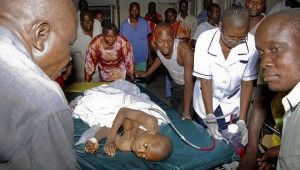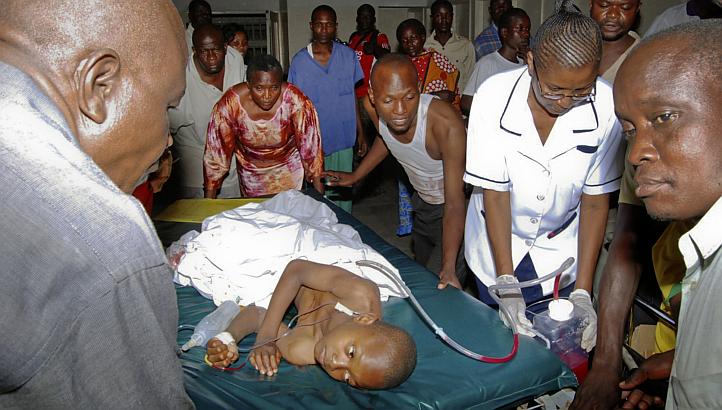
The death toll has risen to three after an explosion on Sunday at the Kenyan port town of Mombasa, which also injured another 22 people a Kenyan Red Cross spokesperson said.
An unknown attacker tossed a hand grenade into a bar where customers were watching the Euro 2012 England vs Italy quarter final game.
Out of the 25 injured victims, three were initially in critical conditions. Two of them have since died raising the death toll to three.
“Two of the victims died in hospital. One had died earlier at the scene of the blast,” Kenya Red Cross spokeswoman, Nelly Muluka said.
Police said they are treating a wounded man as a suspect because he is giving contradictory statements.
The explosion followed an advisory issued by the United States embassy in Kenya warning US citizens of the possibility of such an attack.
On Friday, the embassy in Nairobi alerted Americans saying it had received information of “an imminent threat of a terrorist attack in Mombasa.” It added that all US government travel to Mombasa was suspended until 1 July.
Merely hours before the attack Kenyan Head of Public Service and Secretary to the Cabinet, Francis Kimemia, held a press conference denouncing the warning.
The death toll has risen to three after an explosion on Sunday at the Kenyan port town of Mombasa that also injured another 22 people, a Kenyan Red Cross spokesperson said. An unknown attacker tossed a hand grenade into a bar where customers were watching the Euro 2012 England vs Italy quarter final game.
Out of the 25 injured victims, three were initially in critical conditions. Two of them have since died raising the death toll to three. “Two of the victims died in hospital. One had died earlier at the scene of the blast,” Kenya Red Cross spokeswoman, Nelly Muluka said.
Police said they are treating a wounded man as a suspect because he is giving contradictory statements.
The explosion followed an advisory issued by the United States embassy in Kenya warning US citizens of the possibility of such an attack. On Friday, the embassy in Nairobi alerted Americans saying it had received information of “an imminent threat of a terrorist attack in Mombasa.” It added that all US government travel to Mombasa was suspended until July 1.
Merely hours before the attack Kenyan Head of Public Service and Secretary to the Cabinet, Francis Kimemia, held a press conference denouncing the warning. “It is a reckless advisory and it was totally uncalled for. It is aimed at sabotaging the country’s economy,” he told journalists in Mombasa. Kimemia added that Kenyan officials had written to the US embassy to get them to “reverse their decision”.
The French embassy in Nairobi had also released a warning to its citizens to be “extremely vigilant” when in Mombasa and surrounding areas.
Only four days before the attack Kenyan police had detained two Iranians, one in Nairobi on Wednesday and another in Mombasa on Thursday on suspicions of having links to a terrorist network that was planning bombings in Mombasa.
Sunday’s attack is only the latest in a series of violent incidents this year. Last May there was a bombing at a shopping mall in Nairobi that left dozens dead as well as a Mombasa restaurant being hit with a grenade killing one person. There were two other separate attacks in the northeast that left eight people wounded.
The attacks are seen as a response to Kenya’s invasion of southern Somalia in October 2011 in a bid to oust Al- Qaeda linked Al-Shabab insurgents. Ever since, Kenya has seen a wave of grenade attacks and kidnappings of foreign tourists usually attributed to the Al-Shabab or their supporters. However, Kenya’s intervention was in response to attacks on foreign tourists on its soil by Al-Shabab-linked assailants.
In September gunmen kidnapped a British couple, David and Judith Tebbutt, who were on holiday in the Lamu archipelago. They killed David Tebbutt and sold his wife to pirates in central Somalia. Three weeks later a disabled French woman, Marie Dedieu, was kidnapped from her house on Manda Island and has since died in captivity in Somalia. The attacks, combined with the embassy warnings, will negatively affect Mombasa which is a tourist town. Tourism is one of the main sources of income for Kenya.

